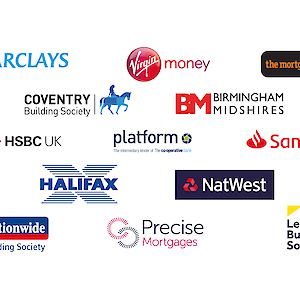


Head of Content

Mortgage Advisor & Director

Being approved for finance with a bankruptcy on your credit reports can be tricky, but what are your chances of securing a mortgage with this type of bad credit? In our guide to getting a mortgage after a bankruptcy, you will learn whether there might be lenders available to you, what criteria you will need to meet, and how the right mortgage broker can help you in this situation.
What is bankruptcy and how does it affect mortgage applications?
Bankruptcy is a legal status that people with debts of more than £5,000 might have to take on if they are unable to repay the money they owe. The process involves turning over your assets so they can be shared among your creditors while you make a fresh start, free of debt.
Bankruptcy is, however, classed a severe form of bad credit and should usually only be considered as a last resort. You could lose your home, car or other valuable assets as part of the process and might find it incredibly difficult to secure any new credit for a period of time.
Mortgage lenders, in particular, are extremely cautious when it comes to borrowers with a bankruptcy on their credit record. Many see it as a major red flag and won’t even consider you for finance until it has disappeared from your credit files. There are, however, specialist bad credit mortgage providers who might consider your application under the right circumstances.
Can you get a mortgage after a bankruptcy?
Yes, despite mortgage lenders viewing bankruptcy as a severe form of bad credit, it is possible to get approved with one showing in your credit history. The bankruptcy usually needs to have been discharged for at least a year before lenders will consider you for a new mortgage.
Some mortgage providers have stricter criteria and would be unlikely to approve you until three years after discharge, but the good news is that your credit situation should improve over time. The number of accessible lenders, rates and deals will increase right up to that six-year mark.
Interest rates and deposit requirements can be higher for post-bankruptcy applicants, though.
How long should you wait to apply?
There’s no reason why you shouldn’t speak to a mortgage broker before the bankruptcy has been discharged. All of our brokers offer a free, no-obligation chat to kick things off, during which they can go through every option with you and advise you on when is best to apply.
Keep in mind that you are unlikely to get approved for a mortgage until at least 12 months after the bankruptcy has been discharged. If you're in a position to wait for three years, the rates and deals available should improve, and continue to do so up to the six-year mark.
Find out whether you are eligible
Mortgage lenders use criteria below to assess the eligibility of post-bankruptcy applicants:
- How long ago the bankruptcy was: It will need to have been discharged for at least 12 months. After this point, more options are likely to open up with each year that passes.
- The reason it occurred: If the issue was the result of an unexpected life event, like illness or redundancy, some lenders might be more lenient than they would be with an applicant who had to declare bankruptcy due general financial mismanagement.
- Outstanding debts and financial conduct: Your chances of mortgage approval are likely to be greater if you can evidence responsible financial conduct - such as paying all bills on time - since the issue was discharged, and have no residual debt from it.
Other requirements
As well as reviewing the circumstances around your bankruptcy as part of their credit checks, mortgage lenders will also assess your general eligibility, which includes these factors:
- Deposit amount: You will likely need to put down extra with a bankruptcy on your record. The total amount you will need can be anywhere between 15% and 40% of the property’s value - see the table in the section below for more on this.
- Age: Lending to someone with a bankruptcy who will be aged 75-85 during the mortgage term will be an added complication for some lenders that drives the level of risk up too high - specialist advice is available for older borrowers with bad credit.
- Property type: Some lenders will also see it as an additional risk factor if the property you are buying has any non-standard construction features, such as a thatched roof, steel frame or concrete construction. Speak to a mortgage broker if this is the case.
The criteria above was sourced from Criteria Brain and Knowledge Bank.
How much deposit you will need
We have already touched on the fact that you may need to put down extra, but the table below reveals the approximate amount you will need based on when the issue was discharged.
Years Since Bankruptcy was Discharged | Estimated Deposit Amount Needed | Approximate Number of Approachable Lenders |
1 | 40% | Few |
1-2 | 25-30% | 11 |
3-6 | 15-20% | 40 |
6 or more | 5-10% | 70 |
How to get a mortgage after a bankruptcy

We recommend following the steps below to get started with your mortgage application:
Check your credit reports: You can check whether your bankruptcy has been recorded as ‘discharged’ by downloading your credit reports. You can do this by signing up for a free trial with CheckMyFile - be sure to check your reports for inaccuracies or outdated information, as you can request to have these errors removed.
Prepare your documents: Having the paperwork you will need ready in advance can help you save time in the long run. This includes proof of address, ID and three months’ bank statements. Your lender might also ask for a certificate of discharge for your bankruptcy, which can be obtained by contacting the Insolvency Service.
Speak to a mortgage broker: Speaking to a bad credit mortgage broker before you apply is highly recommended as they can improve your chances of mortgage approval and increase the likelihood of you securing a favourable interest rate.
There are mortgage brokers at Teito who specialise helping people get onto the property ladder post-bankruptcy. Make an enquiry online to set up a free, no-obligation chat with one of them today, learn what your options are and find out what kind of rate you qualify for.
Available mortgage lenders
Mortgages for people with a bankruptcy showing up in their credit history are often provided by specialist lenders who understand the needs of borrowers with this form of bad credit. There are, however, lenders on the high street who can also consider offering finance under these circumstances, but their criteria can be stricter and deposit requirements may be higher.
Below you will find examples of the specialist lenders who offer post-bankruptcy mortgages as well as some of the specific criteria you might encounter from them:
Mortgage Lender | Criteria for Borrowers With Bankruptcies |
Will consider lending if the bankruptcy has been discharged for at least three years and the borrower has no missed payments or other adverse in that period. | |
Has mortgage options for customers with a bankruptcy that was discharged between three and six years ago. | |
Has mortgage options for customers with a bankruptcy that was discharged between one and three years ago. |
Below are examples of high street lenders who offer these mortgages, and their criteria:
Mortgage Lender | Criteria for Borrowers With Bankruptcies |
Can consider offering mortgages if the applicant’s bankruptcy was discharged at least three years ago. | |
Will consider offering a mortgage if the issue was discharged at least three years ago, subject to credit scoring and underwriter assessments. | |
Can only consider lending if the bankruptcy was registered at least six years ago and is no longer showing on the applicant’s credit reports. |
Browse the latest mortgage rates
The average interest rate at the time of writing (July 2024) for someone with a bankruptcy against their name is in the 5.5-7% range, but keep in mind that a bad credit mortgage broker could help you secure a lower one than this, especially if you have a large deposit or the bankruptcy was discharged 3-6 years ago, or longer.
You can compare the latest rates and deals available for free on Teito. Select the 'Choose your own mortgage' option below to get started:

Compare bad credit mortgage deals for FREE
Remortgaging after a bankruptcy
The hurdles you might face if you need to remortgage your home after a bankruptcy are similar to those who are applying for a mortgage. You are unlikely to be able to refinance before your bankruptcy has been discharged as borrowing restrictions will be in place.
After discharge you will still find the number of lenders and remortgage deals available to be limited within the first 12 months, although there are a handful of lenders who will consider offering finance from day one after discharge. The deals available should significantly improve from the three year mark and become more readily available up to the six-year point.
Deposit/equity requirements are likely to be high if you are trying to refinance within those first three years, but should begin to normalise towards the 5-10% level after this.
You can read more about this topic in our guide to remortgaging with bad credit.
Why choose Teito for your mortgage needs?
There are mortgage advisors at Teito who specialise in bad credit and help customers with bankruptcies every day. With their knowledge, experience and lenders contacts, they are ideally placed to boost your chances of mortgage approval at the best rate available.
Here are some of the other benefits of choosing Teito:
- Access to the entire market, including exclusive rates and deals
- You can compare rates and deals with us online for free
- We can help you secure an agreement in principle in minutes
- Our brokers are five-star rated on leading review sites
Ready to get started with a bad credit mortgage specialist? Make an enquiry to kick things off with a free, no-obligation chat that won’t leave marks on your credit report.
FAQs
Yes. It is possible to get a second mortgage to buy another property with a discharged bankruptcy on your files, but the rates are likely to be higher compared to primary residence mortgages and the criteria more stringent, particularly around affordability.
It is also possible to get a second charge mortgage, which is a secondary debt that sits behind your primary mortgage, secured against your home. They can be a viable alternative to refinancing for those who hold equity but cannot, or do not wish to, remortgage. You can read more about this type of finance in our complete guide to second charge mortgages.
Choosing an Adviser
Selecting a qualified and experienced mortgage adviser is of great importance. To choose a suitable adviser, evaluate their qualifications, experience, and reputation, and ensure they are regulated by the Financial Conduct Authority (FCA).
Read reviews from previous clients and make sure they provide a clear explanation of the products and services they offer, as well as the fees and charges associated with them.













































































